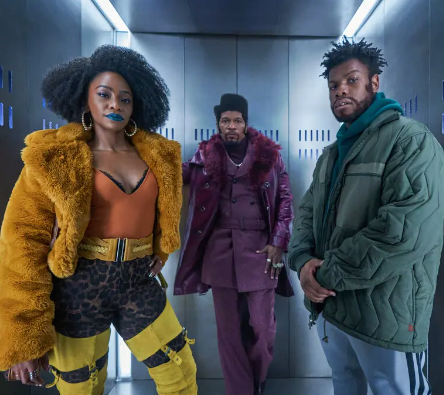
John Boyega joins forces with Jamie Foxx and Teyonah Parris. Photo courtesy of nytimes.com.
The sociology of race is always a tricky subject to touch upon in cinema. Do you talk directly about it, like in Spike Lee’s
Do the Right Thing
(1989)? Or, do you talk around it to generalize it to a grander audience, like in Boots Riley’s
Sorry to Bother You
(2018)? Debut director Juel Taylor attempts to do a mixture of both in
They Cloned Tyrone
(2023).
In classic archetypal dystopian fashion, the film’s opening scenes instill a deceptive sense of normality and routine. Fontaine (John Boyega) is making his daily rounds as a drug dealer: working out with his shiny gold grill flashing as he grunts, driving around one of his young protégés as he recalls his favorite SpongeBob moments, steering his car into a man who disrespects him and then ending his day by confronting Slick Charles (Jamie Foxx) about his debt. You know, a typical day in a life full of trials and tribulations. These presumably cyclical occurrences of events become upended when Fontaine’s ways catch up to him in the form of getting “50 Cent”-ed (shot many times). To both the audience’s and Fontaine’s surprise though, he wakes up the following day and repeats his daily tasks with pressing internal unease. This is only exacerbated when he returns to Charles’ motel room, only to be called a “ghost” by the pimp and subsequently receives a conformational postmortem from Yo-Yo (Teyonah Parris), one of Charles’ working girls. After searching for clues to this mystery in “Nancy Drew” fashion, the trio uncovers a confidential governmental conspiracy that has been treating their home, the Glen, as a testing grounds for extreme methods of forced societal conformity in order to unite a country that has been so riddled with antagonistic race relations and general patriotic backsliding.
There is no current shortage of dystopian thrillers in our modern television and film ecosystem, but
They Cloned Tyrone
puts itself aside as one that is much more intellectually critical. The dense subject matter of the perception of a racially binary American society–between privileged White people and oppressed minorities–is not a new fascination, but one that has been rekindled throughout this cinematic effort. Whether it touches on facets of pioneering sociological thought with a blatant reference to the Chicago School’s concentric theory of metropolitan areas or it taps into conspiratorial notions of the federal government monitoring our every move,
They Cloned Tyrone
does not lack questions. Similarly, neither do the characters who eventually embark on an insurgency to reveal these secrets to the public.
The creative vision behind
They Cloned Tyrone
only adds to its idiosyncrasies. The crackling celluloid and found-footage-esque nature of the color-grading only emboldens the surrealism revolving around these very real themes of American society. More than this though, the film embraces 20th-century Blaxploitation tropes, such as in the wardrobe or score, in coalescence with modern mentions of Blockchain and social media. The film understands that time is fickle, but that there’s a modern effort to revert back to the days of lopsided empowerment among, and by, the elite. Speaking of time as guidance for this film,
They Cloned Tyrone
ensures that it pays homage to its creative predecessors in the form of direct references to
Clockwork Orange
(1971), among other clear storyboarding inspirations like
Get Out
(2017) and David Fincher’s thriller aesthetic.
Understanding the film’s stylistic basis is essential to providing it with the benefit of the doubt for some of its shortcomings in execution, but its more original features are what leaves more to be desired. Foxx and Parris effectively walk the fine line of their flamboyant characters by avoiding the natural tendency to over-act in roles with that much personality, but, ironically, it’s Boyega’s uncomfortably muted performance that occasionally crosses that boundary. Boyega seems to struggle at times in keeping Fontaine’s deep vocal register consistently low, especially in moments of radical emotion, but his history with fight choreography (
Star Wars)
makes him a perpetually enticing watch during moments where tensions boil over.
They Cloned Tyrone
is an ambitious attempt at social commentary that will forever remain salient. Just like any director’s debut film with such intense aspirations, the feat of carrying them out can become inevitably overwhelming. Taylor hit the mark in casting a group that does enough of the heavy-lifting to overshadow the natural technical immaturity that is associated with first-time directors, but when the performances start to falter, so does the film’s overall quality.